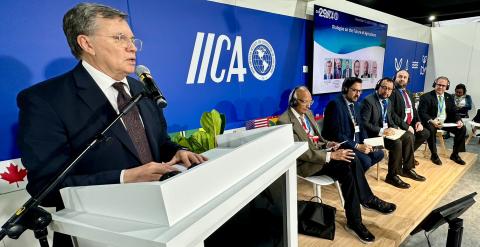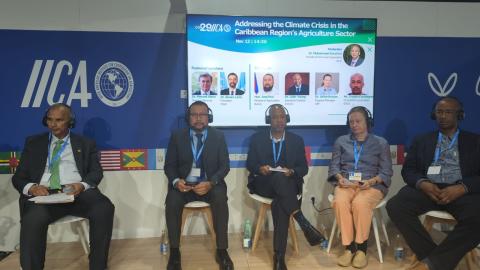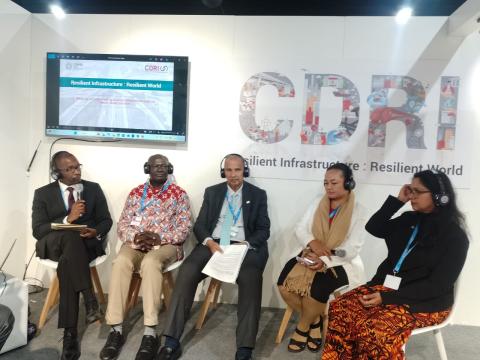
The Importance of Agriculture in Climate Action
Climate change is a reality that is already among us. Droughts, floods, and other extreme events are being recorded with increasing frequency and intensity.
Agriculture is a very important part of the solution to this global challenge, both from the perspective of adaptation and mitigation (reduction of greenhouse gas emissions or increase in their absorption).
The importance of the sector for food and nutritional security, and its leading role in the sustainable development of countries, has led different actors to express a greater interest in deepening the issue of agriculture in climate change negotiations.
Given this situation, IICA arrives at COP 29 with the conviction that the sector can never again be absent from the main area where decisions are made about the way forward to address the crisis, at a juncture when the food issue is at the top of the global agenda.
"We are going to Azerbaijan with a voice of hope and encouragement, because this is the time for the agriculture of the Americas.We believe in the strength of our farmers, in our businessmen, in our entrepreneurs, and in the Ministers of Agriculture of the continent, who are going to meet at COP 29,” highlights Manuel Otero, General Director of IICA.
The IICA brings to COP 29 the triple message that agriculture is part of the solution to the environmental crisis, that science and new technologies must play a key role in the transformations that are taking place in agrifood systems, and that farmers should be sitting at the debate table and play a leading role.
Agriculture has a great potential to contribute to mitigating climate change, to create solutions for the rest of the environmental challenges, and to ensure the food and nutritional security of the planet.
In particular, the Western hemisphere is responsible for about 28% of the planet's agrifood exports, which also represents a fundamental contribution to the regional economy, in the context of the great challenges presented by the social scenario.
In addition, good agricultural practices such as conservation agriculture, minimum tillage, agroforestry systems, water management, improvements in soil health, among others, provide numerous benefits and opportunities.
Previously, at the 2017 COP held in Fiji, the so-called Koronivia Joint Work on Agriculture was agreed. Since then, it has been officially recognized the unique potential of agriculture to tackle climate change, and a new process was established aimed at deepening the debate on agriculture at the United Nations Framework Convention on Climate Change (UNFCCC).
“We are convinced that agriculture is a fundamental sector for climate change mitigation, and at the same time, it needs to be transformed to be adapted to the new conditions imposed by climate,” points out Manuel Otero, General Director of IICA.


What is the COP?
The Conference of the Parties (COP) is the supreme political body of the United Nations Framework Convention on Climate Change (UNFCCC), which has 197 States Parties. It is considered the largest global forum for negotiating climate policies.
Its summit meeting is held once a year, and global conferences are held in which technical experts, ministers, heads of State, and representatives of non-governmental organizations participate. Decisions are taken there to achieve the objectives of combating climate change, and they can only be taken by unanimity of the Parties.
The first meeting of the COP was held in Berlin, Germany, in March 1995. This year, the twenty-ninth edition will be held in Baku, Azerbaijan, from November 11 to 22, 2024.
Just as the COP presidency rotates between the five recognized regions of the United Nations Organization (UN), such as Africa, Asia, Latin America and the Caribbean, Central and Eastern Europe, Western Europe and others, the COP headquarters changes between these regional groups.
The last presidency that LAC has had was the COP25, in charge of Chile, although the meeting was held in Spain. Peru, Mexico, Canada, and Argentina are the other countries in the region that have hosted it.
This year, the COP is being held in a context of global temperatures reaching record levels, extreme weather events affecting people around the world, geopolitical conflicts, concern about energy security and global instability.
A key issue of 2024 will be financing, given that trillions of dollars are needed for countries to achieve a significant reduction in their greenhouse gas emissions and to protect lives and livelihoods from the effects of climate change.
About the United Nations Framework Convention on Climate Change (UNFCCC)
The United Nations Framework Convention on Climate Change (UNFCCC) is an international treaty that provides a general framework for countries to face the challenges caused by climate change.
It has an almost universal membership: the 197 countries that have ratified the Convention are called Parties within it.
It entered into force in March 1994 and aims to stabilize greenhouse gas concentrations at a level that prevents dangerous anthropogenic (human-induced) interference in the climate system.
It states that “that level should be reached within a time sufficient to allow ecosystems to adapt naturally to climate change, ensuring that food production is not threatened and allowing economic development to continue in a sustainable way.”
The Paris Agreementadopted at the 2015 COP, is the main treaty under the UNFCCC, and establishes the goal that all countries must prevent the increase in the global average temperature of the planet from exceeding 2ºC compared to pre-industrial levels. Moreover, it seeks to promote additional efforts that make it possible for the global temperature increase not to exceed 1.5ºC.


Home of Agriculture: for the Third Consecutive Year, the Voice of the Producers of the Americas Arrives at the COP.
Once again, IICA and its partners will be present at the most important global forum on environmental issues, with the pavilion “The Home of Sustainable Agriculture of the Americas.”
This marks the continuation of a firm will to make the voice of the agricultural sector heardThe pavilion has already been at COP 27—in Sharmk-El-Sheikh, Egypt—and at COP 28—in Dubai, United Arab Emirates—, where it attracted attention to the role of agriculture as a solution to the main challenges the planet faces..
At COP 29, the space will bring together the main actors of the hemisphere's agrifood systems and will have the doors open to the world, which will be given an appointment at the Conference.
It will be a collaborative environment, the focus of which will be the science-based solutions for the climate crisis and strengthening the collective action to build a more resilient agriculture in the hemisphere.
The pavilion will house around 50 conferences, in which the different aspects of the relationship between agriculture and the environment will be discussed and analyzed, including topics such as: financing for sustainable production and adaptation, soil conservation, combating deforestation, regenerative agriculture and circular economy, among others.
The Home of Sustainable Agriculture of the Americas will also be the expression of a key continent for the fight against global hunger and environmental sustainability.
Agenda
NOV 11
 11 Nov
11 Nov
Vulnerability and Risk Reduction in LAC Countries through Alternative Financing Approaches and Nature-Based Solutions - IICA / UNFCCC Official Side Event
NOV 12
 12 Nov
12 Nov
Reserved - Bilateral Meetings - IICA
NOV 13
 13 Nov
13 Nov
Coffee and Conversation with IICA Director General Manuel Otero and Leaders of the Agricultural Sector - BRF/Marfrig and IICA, Sustainable Livestock and Food Security
 13 Nov
13 Nov
Dialogue for Climate Action: Farmers' Voices in the Fight Against Climate Change, with the participation of Dr. Michael Kremer and IICA agricultural leaders
 13 Nov
13 Nov
Renewable Biofuels-Solutions from the Land Solutions from the Land
 13 Nov
13 Nov
Addressing the Climate Crisis in the Caribbean (Theme: Island States-Caribbean-Adaptation) with participation of IFAD President, Alvaro Lario and Ministers of Agriculture, Caribbean
 13 Nov
13 Nov
Dialogue for Climate Action: The future of Agriculture - IICA
NOV 14
 14 NOV
14 NOV
Invasive Species Driving Biodiversity Loss and Global Food Insecurity - Solutions from the Land
 14 NOV
14 NOV
Bridging Financial Gaps to Accelerate Implementation of Climate Smart Food Systems - IICA
 14 NOV
14 NOV
A new narrative for the agri-food system - Meeting and debate with media and journalists
 14 NOV
14 NOV
Addressing Agrosystems Adaptation through Nature Based Solutions (NbS) as a Vulnerability and Risk Reduction Measure in the LAC Region Outside the Pavilion, UNFCCC + IICA
 14 NOV
14 NOV
Role of Biofuel in Decarbonizing the Transport Sector - IICA
 14 NOV
14 NOV
Official launch of IICA's Hemispheric Fund for Resilience and Sustainable Agriculture: FoHRSA
NOV 15
 NOV 15
NOV 15
Leadership/Climate Policy Breakfast, Conversation with Dr. Rattan Lal, 2020 World Food Prize Laureate and IICA Goodwill Ambassador, and Ministers of Agriculture IICA + FOOD TANK
 15 Nov
15 Nov
Innovation and Policies for Carbon Farming: Towards a Sustainable and Resilient Future - IICA + FOOD TANK
 15 Nov
15 Nov
Free time for networking or bilateral meetings in the Pavilion
 15 Nov
15 Nov
Livestock - BRF/Marfrig
 15 Nov
15 Nov
Feeding the Next Billion: A Model for Building Climate-Resilient Food Systems - JBS
 NOV 15
NOV 15
Happy Hour - Leadership/Climate Policy, Conversation with Krysta Harden, USDEC IICA + Food Tank
NOV 16
 NOV 16
NOV 16
Breakfast - Leadership/Climate Policy, Interview with the Minister of Agriculture and CropLife Brazil IICA + Food Tank
 16 Nov
16 Nov
Dialogue for Climate Action: Can Livestock Go Green? - IICA + FOOD TANK + Partners
 16 Nov
16 Nov
Leveraging Biotech Value Chains to Advance Food Security and Sustainability - BIO and Partners
 16 Nov
16 Nov
Dialogue for Climate Action: Circular Bioeconomy Solutions from the Land + Partners + IICA
 16 Nov
16 Nov
Sustainable livestock production in the Southern Cone of America with EMBRAPA - MAPA/Brazil

Happy Hour - Liderazgo/Política climática, Entrevista con Paulo Pianza, BRF Marfrig, Brasil - IICA + Food Tank + Partners
NOV 18
 18 Nov
18 Nov
Breakfast - Interviews with leaders and ministers from the Caribbean region - IICA + Food Tank
 18 Nov
18 Nov
Dialogue for Climate Action: No Water, No Food Security - IICA + FOOD TANK + Solutions from the Land
 18 Nov
18 Nov
Changing Practices and Increasing Sustainability—an Integrative Commitment to Policy Success - Agri-Food Canada with Brazil and Australia
 18 Nov
18 Nov
Trade for Climate Resilience in Agri-Food Systems (Theme: Sustainable trade)
 18 Nov
18 Nov
The Road to COP30: Rising Farmers’ Voices in Climate Action - NDCs and NAPs - USDEC
NOV 19
 19 Nov
19 Nov
Vision for Adapted Crops and Soil (VACS) IICA, State Department, CIMMYT, IICA + Food Tank
 19 Nov
19 Nov
Dialogue for climate action: Solutions from our Sector - Ministers Fireside Chat
 19 Nov
19 Nov
Livestock’s Role in the Voluntary Carbon Market Evolution: Advancing Livestock Producer’s Livelihoods Through Sustainable Solutions - Elanco
 19 Nov
19 Nov
Challenges of Floods and Drought in Food Security in the Americas - MAPA/Brasil
 19 Nov
19 Nov
Promoting Transformative Innovation for Climate Action in Agroforestry - UN Climate Change Side Event - IICA
 NOV 19
NOV 19
Happy Hour: Interview with climate leaders, networking IICA + Food Tank
 19 Nov
19 Nov
Investing in the Future in Sustainable Livestock Systems – Stimulating Action and Impact - Pabellón FAO/CGIAR
NOV 20
 20 Nov
20 Nov
Space Available for Bi-Lateral Meetings and Informal Networking
 20 Nov
20 Nov
Growing Climate Solutions: Bioeconomy Insights from Hemp and Cotton - EMERGING AG INC
 20 Nov
20 Nov
Sustainable Livestock – Evidence and Solutions - Protein Pact
 20 Nov
20 Nov
From Data to Decisions: Strengthening Agricultural Resilience/Collaborative Solutions for Climate-Resilient Agriculture - Ministry of Agriculture of Israel, OAS and Bayer
 20 Nov
20 Nov
Pathways Toward Lower Emissions through Improved Animal Health and Husbandry Global Roundtable for Sustainable Beef
NOV 21
 21 Nov
21 Nov
How Can We Accelerate Regenerative Agriculture? - Bayer

Espacio disponible para networking en el pabellón

Cierre del pabellón
Partners
The main sponsor of the IICA pavilion at COP 29 will be the Protein Pact, which brings together the main actors in the value chain of animal production in the United States, committed to the welfare of people, animals, and climate action.
The space will also be supported by International CropLifethe U.S. Dairy Exporters Council (USDEC), la compañía de ciencia e innovación agrícola ; Bayer, the agricultural science and innovation company, and the food company BRF/Marfrig.
It will be also sponsored by Carbon Asset Solutions, a global leader in climate solutions for agriculture; the U.S. Soybean Exporters Council (USSEC)the Grain Council of the United States; the companies Elanco, JBS, PepsiCo, Inspiratus Technologies y BIO, and the Organization of American States (OAS).
Main Sponsors
Sponsors
Media Partners
News
The Conference of the Parties o COP es la reunión anual de los países firmantes de la CMNUCC, casi la totalidad de las naciones del mundo, en el que presentan sus posiciones y avances para controlar las emisiones de gases de efecto invernadero y así reducir los efectos negativos de las acciones humanas sobre el clima. En el camino hacia la COP29the IICA dirigirá sus acciones para buscar elevar el perfil de la agricultura de las Américas en ese foro global.
Sector agropecuario de las Américas brilló en COP29, donde demostró al mundo que es esencial para seguridad alimentaria y ambiental
Países del Caribe relataron en COP 29 el impacto de los fenómenos meteorológicos extremos sobre la agricultura y mostraron su trabajo para ser resilientes
Soluciones basadas en la naturaleza son el camino hacia resiliencia de las comunidades rurales, afirman en debate promovido por la Commonwealth en COP 29, con participación del IICA
News
The agriculture sector of the Americas shone brightly at COP29, where it demonstrated to the world that it is essential for food and environmental security
At COP29, Caribbean countries described the impact of extreme weather events on agriculture and showed what they are doing to build resilience
Nature-based solutions are the path to resiliency for rural communities, affirmed panelists in a discussion organized by the Commonwealth at COP29, with the participation of IICA
Notícia
O setor agropecuário das Américas brilhou na COP29, onde demonstrou para o mundo que é essencial para a segurança alimentar e ambiental
Na COP29, países do Caribe relatam o impacto dos fenômenos meteorológicos extremos na agricultura e mostram seu trabalho para se tornar resilientes
Soluções baseadas na natureza são o caminho para a resiliência das comunidades rurais, asseguram em debate promovido pela Commonwealth na COP29, com participação do IICA
Videos
Agriculture in the Americas at COP29: This year, agriculture and its contributions to climate change mitigation and sustainability will be one of the main focuses of attention during the Conference of the Parties (COP20) within the framework of the United Nations Framework Convention on Climate Change scheduled for November, due to the challenges posed by the climate crisis and the opportunities offered by the sector to incorporate science, innovation and technology into food production methods, a fundamental issue to guarantee food and nutritional security for the planet.



























